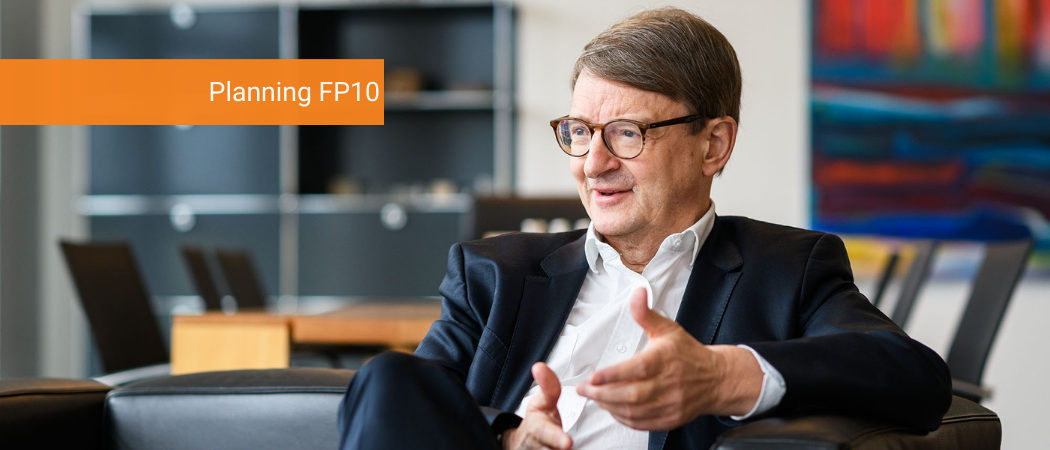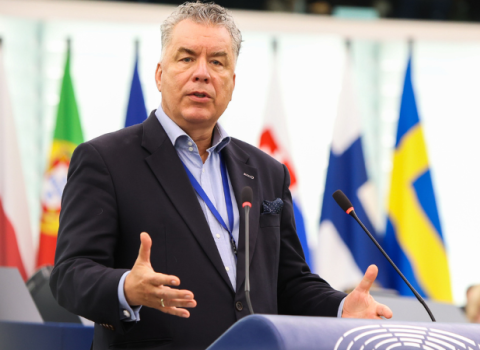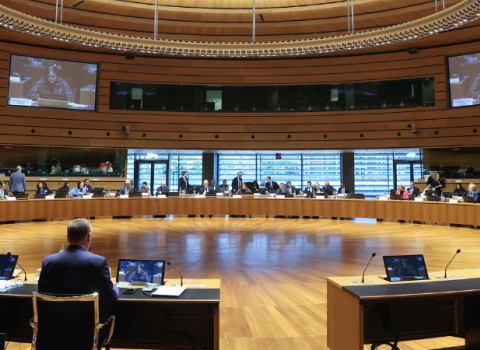Otmar Wiestler wants the next framework programme to include EU-wide efforts to take industrial leadership in new technologies. He’s also not in “fundamental opposition” to military dual use research calls in Horizon Europe’s successor

Otmar Wiestler, president of the Helmholtz Association. Photo: Helmholtz
The head of one of Germany’s biggest research networks wants to replace Horizon Europe’s missions with pan-EU projects to create a world leading solar industry, and medically or climate focused AI models.
Otmar Wiestler, president of the Helmholtz Association, set out his priorities to Science|Business as discussion in Brussels gets underway over the shape of framework programme 10 (FP10), the successor to Horizon Europe that is due to start in 2028.
He’s highly critical of Horizon’s missions, five new initiatives that aim to achieve specific results – healthy soils, for example, or climate neutral cities – by 2035.
Despite being “heavily funded”, the missions have “very little impact,” he said.
“My impression is the money is just distributed at large scale, there is no focus on excellence, or quality, and eventually it will fail,” he said.
Instead, FP10 should include new kinds of flagship projects to make sure Europe takes the industrial lead on technologies that emerged from its labs – a common concern of critics that worry the continent repeatedly fails to capitalise on its strong basic research.
For example, European researchers have been instrumental in developing perovskite-based solar cells, touted as a new more efficient and flexible complement to silicon panels.
But unless Europe actually manages to scale up production of these panels, Wiestler fears that China will overtake the continent, just as it did in the 2010s with silicon solar panels, destroying the once-leading German solar industry.
“I am very much worried that the same thing is going to happen again,” he said. “We are at the forefront of fundamental research - although the Chinese are catching up very rapidly in this area - yet we fail to upscale the technology and make sure that we can capture future markets.”
National governments are of course ploughing their own money into supporting their domestic industries, solar and otherwise. But given the size of the markets, it makes much more sense to try to do this at a European level, perhaps through FP10, Wiestler argues.
“There are some scattered distributed activities, but there is no targeted effort with a clear goal, we want to develop this technology in Europe at the very highest possible level,” he said.
EU funded AI models
Wiestler also wants FP10 – if not the latter half of Horizon Europe – to pour money into funding European-built AI models, so as not to fall further behind the US and China.
The consensus at the recent World Economic Forum in Davos, Switzerland, was that the EU is severely lagging when it comes to artificial intelligence, he said. “Europe doesn’t play a significant role here,” warned Wiestler.
The key underlying models for generative AI, such as OpenAI’s GPT-4, are all being developed in the US.
“That race is lost,” he said. “But application of these new technologies on important domains, that's where there is a real opportunity for Europe, but we must get our act together.”
For example, the EU could “support a limited number of highly ambitious foundation models to be developed at the European scale”, funded through a call and selection procedure, he said.
These could be industry specific – think a medically focused AI model, he suggested, or a climate related one.
In these kinds of domains, the EU could beat the US, because academic institutions have access to the kind of medical and climate data that could power specialised models, Wiestler argued.
“This is where a unique opportunity is,” he said. “This is why Google and Microsoft will never capture this field. They don't have access to medical data and they don't have the medical expertise”.
Backing public AI models “would be much smarter than funding a large mission,” he said. “It would have much more impact”.
But FP10 might be too late to launch such calls, he warned. “This would have to be done now because the train has started rolling,” he said.
Wiestler’s proposal for EU-funded AI models adds to similar calls from AI experts, who worry the European private sector alone cannot compete with US tech giants.
Dual use research
Another of the big questions hanging over FP10 is whether, as Europe nervously eyes its military strength in the face of an expansionist Russia, parts of the programme should permit military dual use research projects, one of the proposals put forward by the Commission last week.
Wiestler said he would “not be in fundamental opposition” to such a change. “This is a delicate issue, but we must face reality here,” he said.
“We have reduced our military activities systematically for 30 or 35 years, certainly in countries like Germany, but all of a sudden, we find ourselves in a situation where we probably wouldn't be able to defend ourselves,” he said.
“So I think everything has to be sort of reconsidered here. When we all feel that we must build military capacity in our countries, we have to find a way to sort of promote military research.”
However, whether dual use research is funded out of the existing research budget is an issue that needs to be carefully debated, he added.
ERC-EIC interaction
Wiestler would also like to see more interaction between the European Research Council – Horizon Europe’s prestige funder for curiosity driven research – and the European Innovation Council, the newly established innovation funder.
“I think that is also a very interesting way to go, which should be further supported,” he said.
But he stressed he’s not arguing for a tilt away from fundamental research in favour of applied in FP10. Posing it as a conflict between the two is “really dangerous,” he said.
“Just look at the Americans, see all the power they have in Stanford, and Harvard, they build on very strong fundamental, disruptive research,” he said.
Instead, the priority is on strengthening the interactions between fundamental and applied, he stressed.
Split in Europe
Widening is also on his agenda. The continued imbalance between the scientific prowess of EU member states is a “major threat” for Europe, Wiestler said.
“The major challenge I think we have in the European research area is we have only a limited number of member states who are very strong in education, research and development and those who are increasingly falling behind,” he said.
But attempts to close this gap cannot come at the expense of funding “excellence” – instead the answer needs to come through systematic training, partnering and cooperating regimes between strong and weaker institutions, rather than a more redistributive funding approach, he said.
Also on Wiestler’s wishlist for FP10 is a bigger focus on “real high end world class research infrastructures”, be it scientific aeroplanes or ships, supercomputers or particle accelerators. “They are real magnets for international scientists,” he said.
And finally, he would like to cut through the bane of many researchers’ existence – grant paperwork. The reporting required of EU grantees is “way too extensive” but “at the end doesn’t help at all”.





 A unique international forum for public research organisations and companies to connect their external engagement with strategic interests around their R&D system.
A unique international forum for public research organisations and companies to connect their external engagement with strategic interests around their R&D system.